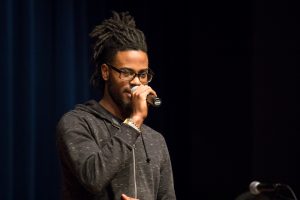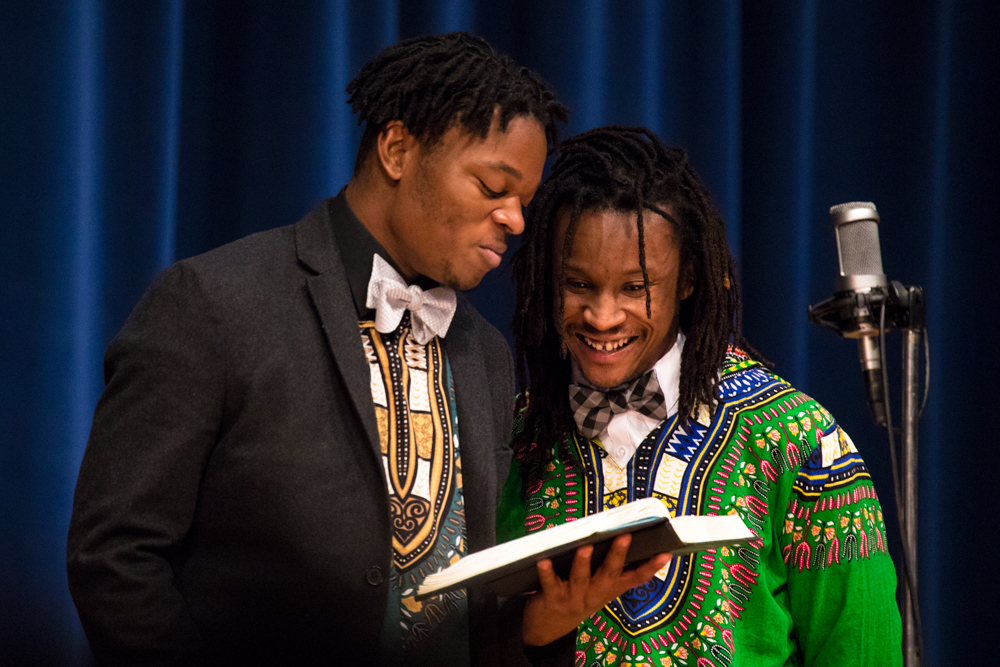
In 1967, Sharon Washington Risher heard The Rev. Dr. Martin Luther King Jr. speak in Charleston, South Carolina. Then a little girl, she remembers being summoned with a phone call from her mother to dress in her Sunday best, to walk alone down the street to the hall where he would speak.
Settled in the back, she remembers, “I couldn’t see, but I could hear Dr. Martin Luther King’s voice and in my young mind, he sounded like what I thought God sounded like,” she told the large crowd gathered in Eastern Mennonite University’s Lehman Auditorium.
That “little ol’ Geechee girl from Charleston” knew then that she, too, wanted to speak, to “stand up in front of a crowd and they would want to hear what I had to say.”

Risher visited Eastern Mennonite University to speak at Monday’s celebration chapel service in honor of King. The hour-long service was a culminating activity of EMU’s MLK remembrance events, which began Jan. 10 with a religious diversity workshop and continued over the weekend.
‘Serious times’
An ordained preacher and hospital chaplain now living in Dallas, Texas, Risher has become, like King, an “accidental activist,” traveling the country to preach a message of love even though she has every reason to hate after her mother, cousins and childhood friend were among those slain in a Charleston church by a white supremacist in 2015.
“Remain awake through this great revolution,” she admonished, taking the phrase from King’s 1988 sermon in Washington D.C.’s National Cathedral. “…These are serious times we are living in now … as serious as the Middle Passage, as serious as those whips and chains and auction blocks, as serious as the Montgomery bus boycott, the Million Man March, the killing of Trayvon Martin and Tamar Rice, the Million Women March, the killing of nine innocent people in a church, mass shootings all over this country. If we don’t wake up and stay woke, we will have missed all Dr. King fought for. We are living in a new revolution, and it’s just not affecting black people or people of color. This new revolution affects all of us, from each nation and country.”

National holidays are “not enough,” she continued. “Magnificent monuments of granite will not alter the pain or alleviate the sufferings of those who still yearn to breathe free. Their lives will not be in vain. We must not permit Martin King’s memorial to be another stop on the tourist bus route. Where are the new activists? Who will when awakened, disturb the church and humanity from its rest? Who will speak when this new era needs a new Martin? Who is there who is prepared to come after him? What preacher in all our churches is ready to fill the void of his leadership?”
Living into our potential
Prior to Risher’s address, Mayor Deanna Reed invoked King’s spirit to praise the activism of 2017 and to urge its growth: “The foundation that Dr. King laid before us gives us today the blueprint we need for us not to sit back and be silent. We can no longer, in 2018, just let things go, especially in the climate we are in today, when we have leadership who thinks it’s okay to make derogatory comments about our African countries, and chalks it up as tough language. We have a lot of standing we need to do.”
Black Student Union (BSU) co-president Tae Dews echoed this challenge later, both praising EMU as a “diverse community founded on the principles of peacebuilding” and “its wonderful potential” while asking for more leadership and involvement in a “plan of racial justice, a plan of bridging the gap between the different diverse communities that we host here, just more intentionality on building that unity here.”
The week was planned by a committee and BSU members, with guidance from director of multicultural student services Celeste Thomas. Many of them participated in the chapel service, bringing scripture and prayer, a litany and music.
- In her opening remarks, MLK Week committee co-chair and graduate student Oksana Kittrell said that the week was a call to action: “As you focus in on this idea of staying ‘woke’ in a time of oppression for not just brown bodies, but white ones as well, I encourage you to take what you have seen here, learn and experience today, and take the first step, to just stand. Stand on behalf of those who cannot. It’s time for change.”
- Junior Clarissa White provided a scripture reading from Ephesians 4, and BSU co-president Tae Dews led an invocation.
- Senior Maleke Jones performed his song “Caged Bird.”

Maleke Jones performs “Caged Bird,” an original composition. - A litany read by seven students – Tae Dews, Precious Waddy, Brittany Williams, Cameron White, Clarissa White, Grant Amoateng and Oksana Kittrell – highlighted student dreams, hopes and thoughts, with the refrain, “Peace is a daily, a weekly, a monthly, a personal process, gradually changing opinions, slowly eroding old barriers, quietly building new structures.”

